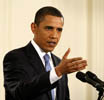
To mark his first 100 days in office, President Obama held a prime time news conference last night, which amounted to a State of the Union-esque reflection on his first three months. The president focused on many of the domestic and a few of the global issues on the minds of Americans right now. Clearly, President Obama has more than enough pressing concerns to fill up an hour-long public address and Q&A. But conspicuously absent from the news conference was any mention of Africa. Not even one. We can probably assume that the president was at least thinking about Africa’s humanitarian and political hot spots – Sudan, eastern Congo, Somalia – when he noted in his opening remarks that he campaigned on “the promise that I would change the direction of our nation’s foreign policy. And we’ve begun to do that, as well.” But at least a hat tip to these pressing concerns would have been valuable.
In particular, we were watching for President Obama to address Sudan, where an estimated 1 million people are at risk of starvation and disease, where a wanted war criminal remains in power and continues to orchestrate horrific abuses against his own people, and where a momentous North-South peace deal is at risk of outright collapse. By appointing a Special Envoy to Sudan, Major General Scott Gration, President Obama took an important first step toward addressing these challenges. But concerns about the administration’s approach abound, and the president and special envoy would do well to address these concerns head on. Commentary this week by Sudan expert Eric Reeves sums up the general sentiment we’ve been hearing from many NGOs and activists:
Faced with the first critical challenge posed by Darfur, Obama has capitulated, deciding that “normalized relations” with Khartoum aren’t such a bad idea after all. We are still missing many details of this new policy, but most notable is its timing, coming at the very moment in which the international community, preeminently the US, must decide whether to resist Khartoum’s latest effort at blackmail.
Last night would have been a perfect opportunity for President Obama to signal that peace in Sudan remains a priority for his administration, without delving into the details of his administration’s new Sudan policy.
Photo: AP/Gerald Herbert

